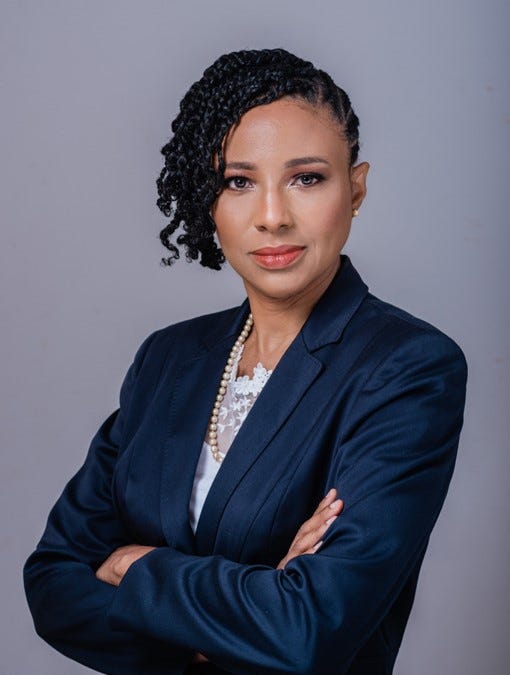Risha Alleyne
Friday Feature, Risha Alleyne, Aquaculture Development Specialist, Trinidad and Tobago
.
Briefly describe your aquaculture career
In 2016 I took my first aquaponics course with the Ministry of Agriculture, Land and Fisheries in Trinidad. The following year, I took an aquaponics course in Florida then in September 2017 I began a Joint Master's degree in Aquaculture, Environment and Society under the prestigious Erasmus Mundus scholarship programme. After graduating in 2019, it took about 2 years to get a job in my field as an aquaculture consultant with the Food and Agriculture Organization (FAO) of the United Nations in 2022.
Why did you decide on a career in aquaculture or what inspired you to start in aquaculture?
From childhood I have always been fascinated with nature, particularly the oceans and seas. My intention was to become a Marine Biologist, but after my undergrad when I returned to Trinidad, I could not get a job with the main marine science institute here. They said I needed a Master's degree even though the Government indicated there was a need for persons with my degree. I was quite disheartened and got a job in environmental management instead. After working in biodiversity conservation for five years, I got a job as a secondary school teacher. I taught biology and environmental science which included environmental issues associated with aquaculture and mariculture. Since 2015/2016, I was interested in establishing my own aquaponics business with tilapia. I was intrigued by the concept of water conservation and getting different crops: plants and fish from one system. I was taking steps towards this goal. But then, when the scholarship opportunity came around I thought, how convenient and I decided to go for it. I figured it would be a good way to gain experience and networks in the industry. I realise my professional journey as an environmentalist and educator goes well with aquaculture and my current job.
What do you enjoy most about your work?
Working with aquaculture and aquaponics farmers and building their capacities. I admire their tenacity, passion, perseverance and resilience. Also, networking with stakeholders. I also like the fact that gender mainstreaming is an important component of the project.
What has been the most difficult part?
Learning about the struggles of the farmers throughout the years due to climate change, lack of political will, lack of funding. Also, motivating them as they may have given up due to such factors, and my adjusting to bureaucracy from different sides.
What has been your greatest achievement working in aquaculture to date?
Training the farmers and aiding them with their goals towards food security.
What advice would you give to women looking to start a career in the sector?
Do your research. Find out where the gaps are, however ensure that you know as much info as possible about 3 different areas so you don't box yourself into a particular path unless you want to specialise in an area. Being specialised in an area has its pros and cons. Weigh all sides. Don't be afraid to start later in life, I did. I have no regrets. Be prepared to have different roles as aquaculture is relatively new for the Caribbean region. Look into learning more about local/native species. This is an untapped area. Be assertive and observant.
What would like to see achieved for the future of aquaculture in your country?
I want to see more collaboration and research in the Caribbean. More investment in boosting the industry. We must practice and promote sustainable, just aquaculture. We also need to abide by and be certified and trained in HACCP and Good/Best Aquaculture Practices. Certification needs to easily accessible and more affordable for all.
What would be your dream role in aquaculture? and what do you think it will take to be achieved?
Wow, good question. I think building capacity and training persons. Also, a role that involves hands-on experience or working outdoors. I don't like office work. It bores me. I am achieving my dream role somewhat, but I will continue by improving myself professionally, by networking and by keeping my eyes and ears open to opportunities. This is how I can accomplish that.
Risha Alleyne is a dual citizen of Trinidad & Tobago and St. Vincent & the Grenadines. She is an Environmentalist, Educator, Entrepreneur and internationally-trained Aquaculturist. She is the owner of Sustainable Earth Farms and Distributors, a social enterprise agribusiness start-up which aims among many things to produce naturally grown food using climate smart methods.
Her involvement in the environmental field in Trinidad and Tobago spans over three decades. In 2017, Risha received a full scholarship via the EU’s Erasmus Mundus programme to pursue a Joint Master’s degree in Aquaculture, Environment and the Society in Europe. With her new qualifications and continued interests in food security, capacity building, education, conservation and aquaculture, Risha is keen on developing these and other areas to make the Caribbean more food secure, self-sufficient and sustainable.
Previously she worked with the Food and Agriculture Organisation (FAO) of the United Nations as an Aquaculture Development Specialist in a regional aquaculture project which main objective was to “increase the contribution of aquaculture to food security, nutrition and livelihoods in the participating countries”. Her responsibilities included empowering aquaculture and aquaponics farmers by building their capacity in the areas of financial literacy, Good Aquaculture Practices, providing technical assistance and aiding farmers to be climate resilient.
In 2022 she was trained by Helen’s Daughters Women’s Farmers Academy in various topics such as financial literacy and sustainable agriculture. From 2021- 2022, Risha along with her business partner joined GGGI’s Eastern Caribbean Greenpreneurs Business Incubator programme where they secured a USD grant for their business idea. She is a Director for the Caribbean Aquaproducers’ Association.
Risha is one of the founders of Women in Caribbean Aquaculture and played an integral part in getting 8 Caribbean women scientists to their first aquaculture conference at the World Aquaculture Society- Latin American and Caribbean chapter, LAQUA24 in Medellin, Colombia.




